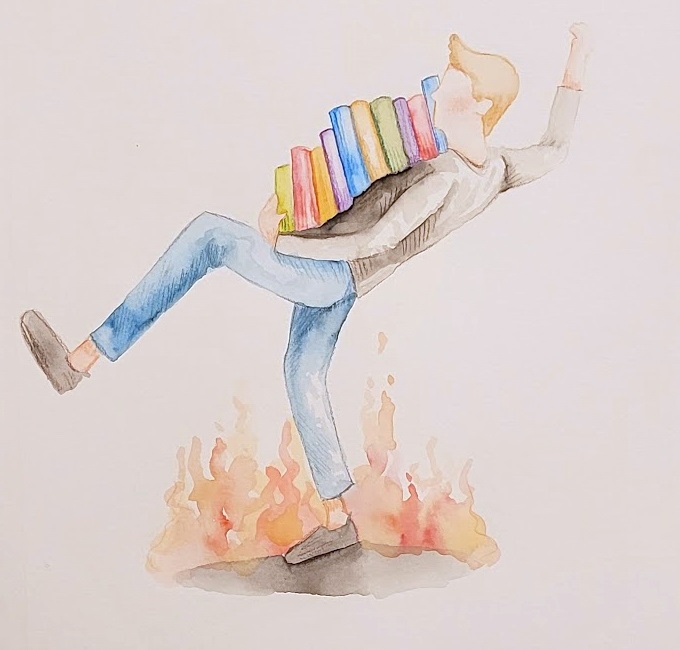Post-secondary students are well aware of the concept of burnout, as many suffer from it themselves. Many university students do not have the ability to focus solely on their studies, but most also work one, or two, or in my case, three jobs in order to feel financially stable. I have had an extremely strong work ethic from a very young age. I got my first job when I was eight years old, walking my neighbor’s dog for $3 a walk. I believe this came from a fear of financial scarcity, which also led to the inability to say “no” to employers calling out shifts. I have been putting so much pressure on myself to achieve so much that I am unable to slow down or take any kind of break. To get an idea of how little I am willing to slow down, last year I fell off a cliff and almost died, breaking my left wrist in the process, but instead of taking time off, I typed up my articles with one hand. Near the beginning of April, I edited the last issue of The Cascade of the winter semester while fighting back the symptoms of full-blown COVID-19. I have come to realize that sooner or later, the sheer exhaustion that happens when we are unable to set boundaries or maintain a healthy work-life balance catches up to us and starts manifesting in physical symptoms, also known as burnout.
Burnout was first defined by American psychologist Herbert Freudenberger in the 1970s to describe a condition he saw in “helping” professions whose job often required them to sacrifice themselves for others, leading to being “burned out.” The symptoms of burnout are exhaustion, cynicism, and reduced performance and motivation to complete tasks.
While burnout is common amongst “helping” professions who work in high-stress environments, it is not limited to doctors, nurses, and frontline workers. A 2021 study using data from four continents estimated that 55.4 per cent of post-secondary students experienced emotional exhaustion, 31.6 per cent experienced cynicism, and 30.9 per cent experienced low academic efficacy, the three tell-tale symptoms of burnout. It comes as no surprise as well that 62.7 per cent of females compared to 37.3 per cent of males experienced these symptoms. These results are similar to another study that concluded that one third of university students in low to middle income countries experience burnout.
Anne Helen Peterson, a reporter for Buzzfeed, noted that the solution to burnout is more than just taking a vacation, as this is not just a temporary affliction. Burnout is the result of our generation’s internalization of the belief that we should be working all the time. As long as we are immersed in a Western society that fetishizes material and monetary wealth and “the hustle” needed to achieve that, burnout is going to be our constant reality and our baseline. Millennials have been programmed to believe that we are lazy, entitled children who spend all our money on oat milk lattes and avocado toast, and that is why we can’t afford a mortgage. We have celebrity influencers who have been born into rich families telling us to “get your fucking ass up and work.”
The solution to burnout is rest. We need to reprogram ourselves to prioritize rest in our lives when we were raised in a culture where rest was unacceptable and viewed as a symptom of laziness. The reality is that rest is for the privileged; rest is afforded to those who are already at the top and don’t have to work three different jobs to pay for rent, gas, food, tuition, insurance, union dues, and all the other bills that go along with middle-class life. Or, you may be avoiding rest not because you have problems paying the bills, but because you need to stay so busy that you don’t have time to confront your inner demons that seem to rear their ugly heads in moments of stillness.
The Nap Ministry preaches that rest is resistance and liberation from our capitalist worldview and society, which is the ultimate barrier to rest. Tricia Hersey founded The Nap Ministry as “a Black woman in America suffering from generational exhaustion and racial trauma” and who views rest as “a political refusal and social uprising within [her] body.”
Luo Huazhong started a similar “rest as resistance” movement in China when he quit his job as a factory worker and decided to pursue interests that brought him joy instead. “Lying flat” is the silent resistance amongst Chinese millennials who can no longer stand working 9:00 a.m. to 9:00 p.m. six days a week, as employers expect, and are still not able to afford a house or have a lifestyle akin to what their parents held. Elsie Chen writes for the New York Times that those young people are “defying the country’s long-held prosperity narrative by refusing to participate in it.”
Rest could be taking a nap in the middle of the day, as is common in countries like Spain, Italy, Greece, Brazil, and Mexico. Rest doesn’t have to mean physical rest, but restful activities could include hiking in the forest, working on your cross-stitch piece, or going out to lunch with a friend — whatever rejuvenates you. Rest necessitates setting boundaries and valuing your time with work that pays you well.
I am practicing what I preach by resigning from one of my three jobs to focus more on what makes life worth living. I hope you can find some rest of your own this summer.
Andrea Sadowski is working towards her BA in Global Development Studies, with a minor in anthropology and Mennonite studies. When she's not sitting in front of her computer, Andrea enjoys climbing mountains, sleeping outside, cooking delicious plant-based food, talking to animals, and dismantling the patriarchy.


